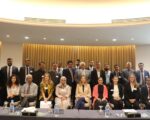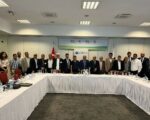 In June 2023, the OECD hosted a workshop in Cairo, Egypt, focusing on tax policy and domestic resource mobilization. On 11-15 June, Yemeni officials from the Ministry of Finance, Ministry of Planning and International Cooperation, Yemen Tax Authority (YTA) and Yemen Customs Authority (YCA) met with Egyptian counterparts for a peer-learning exchange. This tax event was the first peer-learning exchanges between the Egyptian and Yemeni authorities, covering issues on tax and customs policy and administration.
In June 2023, the OECD hosted a workshop in Cairo, Egypt, focusing on tax policy and domestic resource mobilization. On 11-15 June, Yemeni officials from the Ministry of Finance, Ministry of Planning and International Cooperation, Yemen Tax Authority (YTA) and Yemen Customs Authority (YCA) met with Egyptian counterparts for a peer-learning exchange. This tax event was the first peer-learning exchanges between the Egyptian and Yemeni authorities, covering issues on tax and customs policy and administration.
The goal of the tax workshop was to enhance Yemen’s tax and customs systems through sharing Egypt's experiences and best practices in areas such as dispute resolution, risk assessment, transfer pricing and LNG company audits. Yemeni and Egyptian officials took part in technical sessions, held bilateral meetings and discussed the potential integration of Yemen into the Tax Inspectors Without Borders (TIWB) programme. Yemeni officials explored the design and implementation of tax laws, compliance strategies and digital solutions, with a particular focus on strengthening Yemen’s domestic resource mobilization for economic recovery. The tax meeting featured the launch of an e-learning program on tax treaties and transfer pricing in Arabic.
In the margins of the tax workshop, bilateral meetings were held between Egypt and Yemeni Tax and Customs Commissioners and their technical teams to discuss and agree on the peer learning priority areas for future collaboration.
Some key takeaways of the tax workshop:
- GRC, the EU and Yemen are discussing Phase Two of the EU-OECD Programme on Promoting Economic Resilience in Yemen. Phase Two of the programme involves an additional extension of three years beyond 30 June 2024, during which the OECD will continue the implementation phase based on the specific needs of the Yemeni institutions under each component of the project.
- The Yemeni officials expressed appreciation for the OECD approach in facilitating the first peer-learning exchanges between the Egyptian and Yemeni authorities and the engagement of the Egyptian officials in sharing their experience.
- There has been significant progress in the peer-learning exchange between the ECA and YCA due to the longstanding cooperation between the respective administrations. There is a strong will in the Egyptian Government to strengthen the capacity of the YTA and YCA to support long-term sustainable development as soon as a peace agreement is reached. There has also been an agreement between the Egyptian and Yemeni parties to formalise this cooperation through the OECD programme.
- The Yemeni officials advised that 70% of the current officials in the YTA will retire soon and therefore, the priority is to train the junior-middle-level officials. To this end, it was suggested to introduce Train-the-Trainers Programs (along with the tailored workshops agreed upon in the Inception phase) and invite a pool of 10-15 nominated candidates to the next workshops.
- There was noticeable tension between the Yemen Ministry of Oil and Minerals (MoM) and the YTA due to the lack of knowledge of YTA officials regarding auditing activities of Production Sharing Agreements (PSAs)-related files.
The tax workshop concluded with a series of recommendations and actionable steps for improving Yemen’s tax and customs capabilities, enhancing the overall financial resilience of the country.




Leave a Reply
You must be logged in to post a comment.